The Yale Russian Chorus was founded in 1953 at the height of the Cold War. Throughout these 70 years, according to the apt definition of The Wall Street Journal, The Chorus was called “Diplomats of the song.” The Yale Russian Chorus is by far the most famous Russian choir of the United States of America, despite the fact that the choir members are not Russians, and not immigrants from Russia and only a few of them are native speakers of the Russian language and culture.
In 2023, celebrations were held at Yale University on the occasion of the 70th anniversary of the founding of the choir. We talked about the long-term history and current creative activity of The Yale Russian Chorus with Dr. W. Lewis Johnson, PhD, Director of External Relations of The Yale Russian Chorus Alumni Association, creator and head of the YouTube channel of The Yale Russian Chorus.
SR: Last year 2023 was the year of the 70th anniversary of The Yale Russian Chorus, in connection with which the choir held several festive events. Let me congratulate all the members of this wonderful choir on such a significant date. Please tell us about these celebration events.
LJ: Thank you for your congratulations and kind words! The 70th anniversary was an important milestone for us. We performed our anniversary concert at Yale University, which was very well attended. 90 singers came together for this concert. Some had sung with the Chorus from the very beginning, in the 1950s. Our concert was well attended, which showed that there is continuing interest in our music, in spite of the difficult geopolitical situation today. We published recordings from the concert for the benefit of our large audience on YouTube and VKontakte.
In preparation for the anniversary I edited and published a new songbook containing new editions of the bulk of the music in our repertoire. This will be a resource for the Chorus in future years and help the Chorus maintain its musical tradition.
SR: During the celebration of the 70th anniversary of the choir, the role of the founder of the choir Denis Mickiewicz and his associates was emphasized – their courage was spoken about. Apparently, back then, in 1953, it was a pretty brave act. What do you think was the defining factor that allowed such a choir to arise then?
LJ: The Chorus started as a club activity of a small group of Yale students who were very interested in Russia and Russian language. Denis channeled that interest into music of Russia and the Soviet Union. But the defining factor I think was the launching of Sputnik, which led to a sudden increase in interest in the Soviet Union and in cultural exchange with the USSR. The Chorus’s first tour of the USSR was shortly after that.
SR: Do you think could such a choir arise today?
LJ: It would still be possible. The Chorus continues to attract new members and appreciative audiences, which shows that there is continuing interest. Right now, cultural exchange is difficult due to the military conflict in Ukraine and economic sanctions towards Russia. But that hopefully will not continue indefinitely.
SR: You were personally acquainted with Denis Mickiewicz. Please tell us what kind of person he was. What distinctive features allowed him to create a choir with his own sound.
LJ: Denis has a very charismatic personality. In some ways he reminds me of Serge Jaroff, the founder of the Don Cossack Choir, whom I also had the privilege to meet. Denis was familiar with the choral tradition of the Moscow Synodal School and also was musically trained at Yale. He developed a Chorus with a unique sound that combines both of those traditions. It also helped that he was able to attract very fine singers, who could sing as soloists as well as ensemble singers.
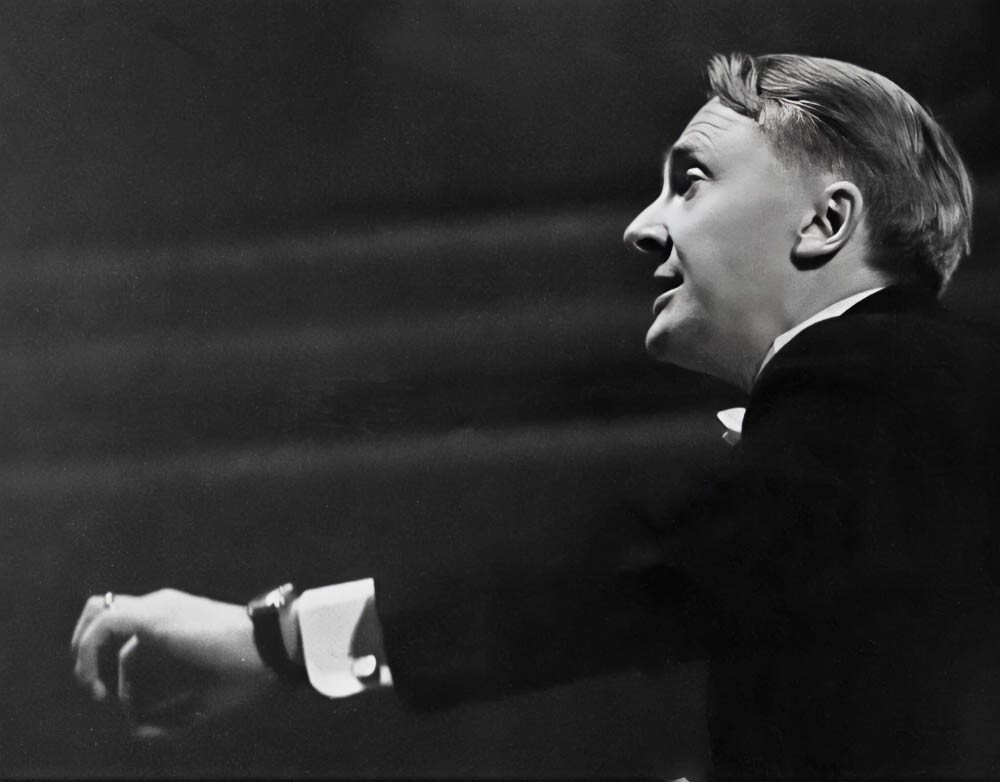
SR: As far as it is clear from the interview, for Mickiewicz, the main thing was not politics, but love for the Russian song. Where did he get his love for Russian song from? Did he have a musical education?
LJ: He was born into a Russian family in Latvia. He studied music in Latvia and continued his education at Yale. He was also exposed to other musical traditions, such as Cossack songs, while living in refugee camps in postwar Europe.
SR: What techniques did Denis Mickiewicz use when working with the choir?
LJ: He insisted on having singers memorize the music, so that he could focus on expression and interpretation. He would provide us with extensive written notes about how he wanted each song performed.
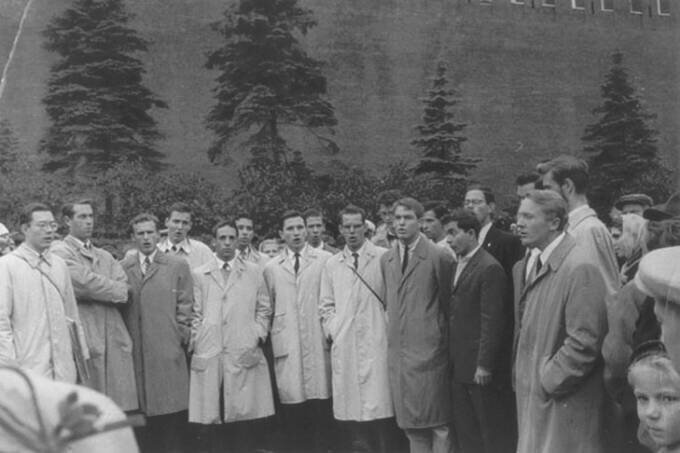
SR: Can you tell us any interesting case related to Mickiewicz during performances or rehearsals?
LJ: He believed that performances of all our music, including our sacred music, should be very dramatic. This was sometimes controversial, since in an Orthodox church service the choral music is often in the background while the priests lead the service. Denis once said: “In concert you have to recreate all the bells and all the icons, and all the gilded stuff and all the people, and so we sing bigger than life.”
SR: Such a long creative life of such an unusual team suggests that it is based on very strong and important traditions that do not change depending on time. What is the main reason, in your opinion, for the creative longevity of the choir?
LJ: Yale singing groups in general have a long tradition. They continue to perform music that they performed in the past, together with new repertoire. It helps that we memorize the music that we sing, because that way singers of all generations remember the music and can sing it together.
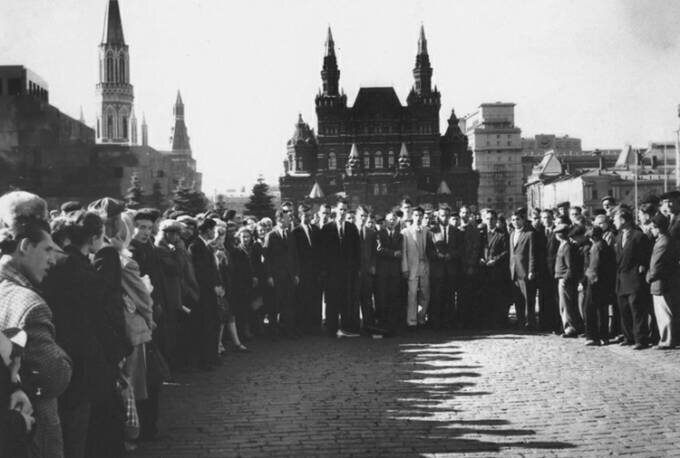
At the same time, each conductor over the years has had his own stylistic preferences and has introduced new repertoire, which future generations often continue to sing. Conductors after Denis introduced music from additional countries, such as Georgia, Armenia, Macedonia, Hungary, and Slovakia.
The songbook that I recently edited captures a variety of the songs that were introduced over the years. The current Chorus is referring to that songbook and reintroducing songs that were sung in the past.
SR: The trend of the early noughties was the fading of interest in teaching Russian at US universities and the closure of many faculties of Slavic studies. Does this trend continue today?
LJ: It is true that there is less interest in learning Russian now. I studied Russian in high school; I doubt that there are many high schools in the USA that teach Russian today. At the same time there has been some broadening of interest in Slavic studies at the university level. There are more programs that teach Ukrainian and other Slavic languages, alongside Russian.
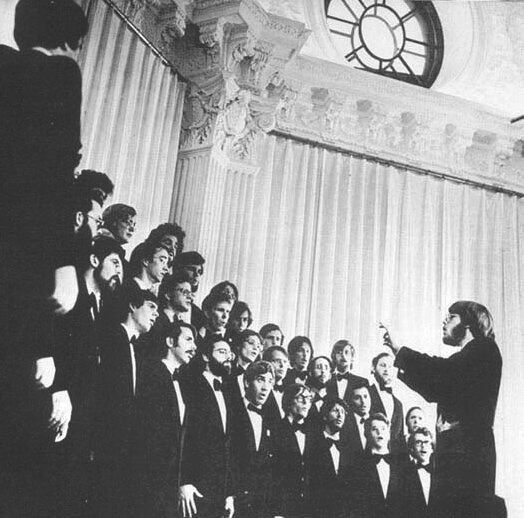
SR: For 70 years, many Yale University students have participated in the choir. Nevertheless, choir rehearsals take place regularly. How do the choir members manage to combine scientific activities and participation in the choir? In Russia, this issue is often relevant not only because of the underfunding of many choral ensembles, but also for vital reasons – people move to different cities and countries, or change their occupation. Does your choir have such problems?
LJ: At Yale students must make time in order to participate in music and other activities. This is part of the experience of being a student at Yale. Yale students are very busy, but they somehow make time for it all.
After students graduate, they often continue to participate in concerts when they can. Of course, many of them are occupied with their careers and do not have much time to learn new music. We run online workshops to help singers learn new music. If they don’t have the time to learn the music, they can skip songs in the concert.
SR: The composition of the choir is very different in age. You yourself belong to the class of 85 – apparently you are almost in the middle of the age range of the choir members, the earliest of which are from the 1950s. As you can see for yourself, what are the main differences between different generations of choir members, and what unites them.
LJ: There is a surprising amount that unites us, since we all know much of the same music. Some generations know music that others do not. In my case, I was in the Chorus at a time when our repertoire was expanding to include the music of the various Soviet republics, Georgia in particular. After the breakup of the Soviet Union the singers interested in Georgian music split off and formed their own ensembles focusing on Georgian polyphony.
SR: University choirs, at least in Russia, are mostly only their students. In your choir, its participants are not only university students, but also graduates of previous years. Is this a feature of your choir only, or is it a common practice in the USA?
LJ: In the USA alumni often come back and join the student chorus to sing selected songs that everyone knows. Our choir is unique in that alumni can join and sing an entire concert if they choose. Last year when the Chorus toured California I joined them. I had to learn some new music but I already knew most of it. It is quite common when the Chorus goes on tour for local alumni to join.
Also, the Yale Russian Chorus was unusual in that it was not limited to students, but accepted singers from the New Haven community. Some Russian emigres would come and sing with us, as would people who simply enjoyed the music.
SR: Does The Chorus members and management discuss other choral groups among themselves, both from Russia and abroad? Are there any teams that are of the greatest interest?
LJ: Many of the choir members find videos online that they like, and share them. We have an ongoing collaboration with composer Anton Viskov and we follow his work. I already mentioned the Don Cossack Choir. Other groups that we follow are the Sretenskii Monastery Choir, the MEPhi Male Choir, VEK, and the Moscow Cossack Choir.
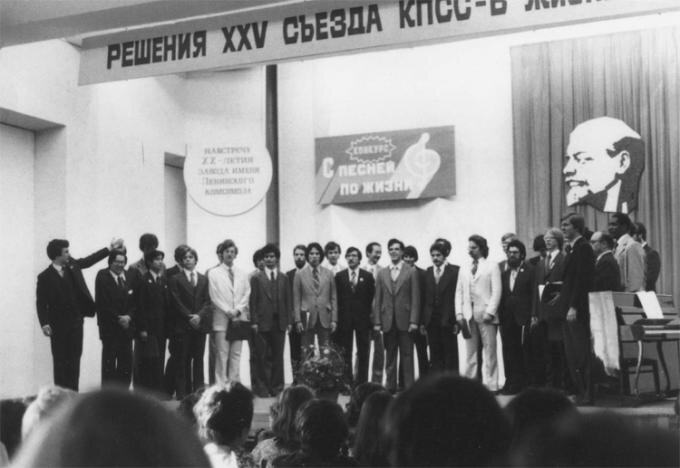
SR: How do you assess the current level of development of world choral culture – which countries offer the most interesting repertoire of choral skills today?
LJ: Personally, I mostly follow choral work in USA, the UK, and Russia. The Stellenbosch University Choir in South Africa is highly regarded. But choral singing is very international, it is hard to single out individual countries.
SR: The question about the musical component of Russian choral singing. What features do you think distinguish Russian choral singing from other song traditions?
LJ: Men’s choral singing appeals to me, and Russia has one of the strongest choral traditions. Of course Russian choral singing is known for its prominent bass lines and oktavist bass notes. Russia also has a strong a cappella tradition.
SR: What is important to you in a Russian choral song? What questions does a Russian song help you answer?
LJ: There are different types of Russian choral music, and they are important for different reasons. I very much like the work of the great classical composers: Bortnyanski, Chesnokov, Tchaikovsky, Rachmaninoff, etc. This choral work is not well known in the West, so I do my part of popularize it. I also very much like the work of modern composers such as Viskov, whose work is very approachable. And I like traditional folk songs because they help us to find common ground with Russian audiences.
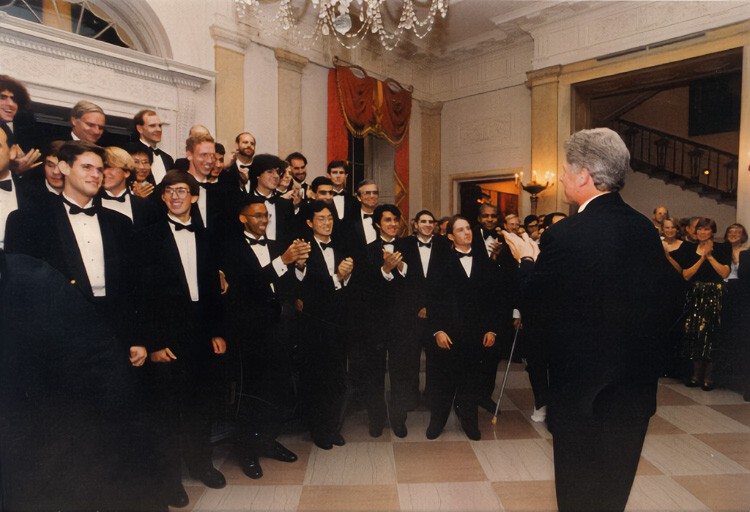
SR: American culture has always been mainly focused on the manifestation of individuality. Why is choral singing popular in the USA anyway? What do you think distinguishes the American choral tradition?
LJ: America has a rich tradition of social groups and organizations; it is not just a collection of individuals. Choral singing is one manifestation of that. There are multiple American choral traditions. One is choral music as part of church worship; many people sing in their local church choir. There are many great choirs that perform classical music, by themselves or with orchestras. And there is a lively tradition of a cappella singing groups and glee clubs at universities. Many of these groups sing arrangements of spirituals, which are folk songs originally sung by slaves. The Yale Russian Chorus draws on these traditions in various ways. We sing American spirituals, alongside Russian folk songs.
SR: The Chorus last performed in Russia in 2019. Please tell us what kind of performances they were, what impression they made on the choir members.
LJ: I personally was not on that tour. But I understand it made a big impression, both for singers and for the audiences. For most of the students was their first time to Russia.
Russian audiences remarked that many of the songs were from earlier eras–the Soviet era and below. On the other hand, the Chorus performed a contemporary song, Matvienko’s “Kon’”. That was very popular, and continues to be popular with our online audience.
SR: You can observe the Russian and American public for many years. Please tell me how the public has changed over the past 20 years. What are the similarities between your audience in the USA and Russia?
LJ: A lot has changed over the last 20 years. Prior to 2020 there was a lot of exchange between Russia and America, certainly more than was the case in the Soviet era. Then the COVID pandemic hit, and travel between Russia and the USA became more difficult. So we developed social media channels, which enabled us to reach a much larger audience not just in the USA and Russia, but around the world. Our audience is international, so our social media channels are русские but not российские.
Then the conflict in Ukraine started, and we lost audience both in the Russia and in the USA. Yet we adapted, and now our online audience is larger than ever. But we have to be careful about what music we perform, to avoid offending audiences either in Russia or the USA.
SR: What foreign tours of The Chorus are planned for the next year or two?
LJ: We are planning a tour to Italy this summer. We do not know yet about next year’s tour.
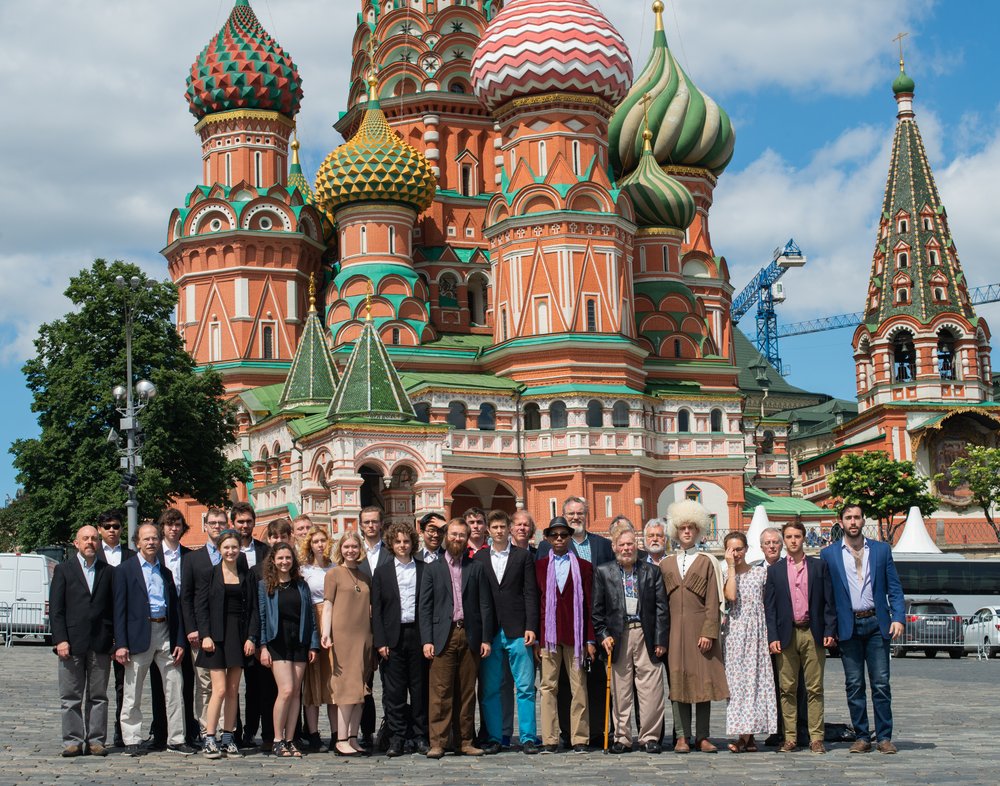
SR: Are the next tours to Russia planned? (if they are not planned, the issue is removed).
LJ: We hope to tour Russia again soon, but it is difficult while economic sanctions are in effect. For example, there are no flights between USA and Russia right now.
SR: The Chorus repertoire includes many religious compositions, mainly from Russian Orthodoxy. In addition, The Chorus has performed in Russian churches on several occasions during its recent tours in Russia. What is important for the choir in this direction of music?
LJ: We started performing Orthodox music during the Soviet period, when it is discouraged in the USSR. We played a role in preserving this musical tradition. We continue to perform it because of its inherent beauty, and to increase awareness of it in the West.
SR: Recently a new collection of songs with vocal scores in the original languages – Russian, Ukrainian, Georgian, Armenian – was published – please tell us about this collection, what is the main feature it has.
LJ: I started working on these scores during the COVID pandemic, to give our singers sheet music and recordings to practice with. Five years ago the Chorus published a collection of old recordings, many of which were remastered and digitized. Listening to these, I realized that much of this music was at risk of becoming forgotten. So I decided to start preparing new editions so that the Chorus could continue to sing it. I collected copies of the original sheet music by Denis Mickiewicz and others, to make sure that new editions accurately reflected the arrangers’ intentions.
In all of the music the original language and the transliterations are printed next to each other. This is to ensure that the transliterations are accurate, and helps those who are able to read the original texts. This was a task to which I was particularly well suited, since I have a degree in linguistics and have worked with many languages over the years.
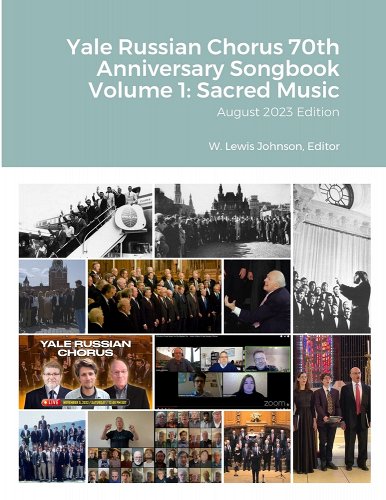
SR: Any creative team faces different difficulties at different times. What difficulties do you think American choirs have nowadays and why?
LJ: Most American choirs had to suspend performance during the COVID pandemic. Choirs are still rebuilding after that, particularly church choirs.
Although choral singing in general is thriving in the USA, men’s choruses are declining in popularity. The Yale Russian Chorus continues to sing music for tenors and basses, but now some women sing the tenor parts.
SR: Choral singing arose to solve the symbiosis of spiritual and utilitarian tasks of human society. What are the main tasks facing choral art today?
LJ: In addition to the tasks you mention, choral art has a role to play in preserving cultural traditions. It provides a sense of community. There is an epidemic of isolation and loneliness in the USA and many places today. Choral singing is an antidote to that. And it can help build bridges between countries and cultures, overcoming political conflicts and differences.
SR: What wishes would you like to convey to fans of choral singing in Russia today from the participants of The Yale Russian Chorus.
LJ: I ask you all to keep listening, and keep singing! And tell your friends about us. Let us continue to share this art form that we love, and build bridges between our countries.
***
SpecialRadio expresses its gratitude to Mr. Lewis Johnson for the interesting interview, and to everyone who made this interview possible.
Photo – from the official website of The Yale Russian Chorus
Video from the official YouTube channel of The Yale Russian Chorus
The official Vkontakte page of The Yale Russian Chorus
Biography of Denis Mickiewicz on the website Russians in Latvia
The text of the interview in Russian
The interview was prepared by Alexander Usoltsev
Specialradio.ru – January 2024
Leave a Reply